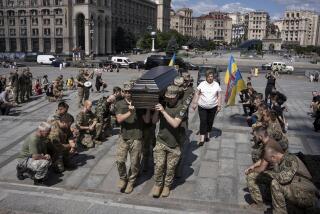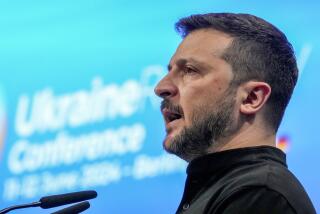From the archives: Russia further cuts gas supply through Ukraine
MOSCOW AND MADRID -- Russia’s natural gas monopoly dramatically cut flows to Europe through Ukraine on Tuesday, sharpening fears of fuel shortages during the bitter days of winter.
Despite warnings from the European Union, a tense pricing dispute between Gazprom and Ukraine showed no signs of letting up even as gas flows dwindled. As the two sides traded accusations and blame, negotiations remained frozen for the sixth day.
Early this morning, Ukraine said Russia had halted all gas delivery to Europe through the country. There was no immediate reaction from Moscow.
Bulgarian authorities said Tuesday that two-thirds of their natural gas supply had been cut off and that consumption would be reduced to ensure provisions for key public facilities such as hospitals and schools. In a dozen other countries, governments said they could compensate with reserves or alternative sources in the short run.
Haggling over the price Ukraine would pay for Russian gas this year, and how much Moscow would pay Ukraine for allowing gas to cross its territory on pipelines bound for Europe, collapsed on New Year’s Eve. Moscow first halted all gas flows to Ukraine, then began to scale back on exports to Europe via Ukraine, accusing the smaller neighbor of stealing the gas intended for elsewhere.
The European Union gets about a quarter of its natural gas from Russia. European customers also experienced a dip in supplies in 2006, when Russia turned off flows to Ukraine in a bout of price disputes. The repeated interruptions have raised anxiety across Europe about the practicality of depending on Moscow for fuel.
Gazprom officials, who have repeatedly urged Ukraine to restart negotiations, remained defiant Tuesday. Alexander Medvedev, the chief of Gazprom’s export arm, listed Russia among the victims of Ukrainian misdeeds, saying, “Russia, Bulgaria and other Balkan countries have become hostage to Ukraine’s unreasonable behavior.”
Ukrainian officials deny siphoning off any of the Europe-bound gas, insisting that they are tapping reserves to keep the country running.
The head of Ukraine’s state energy firm was expected in Moscow on Thursday for renewed talks.
The European Commission in Brussels and the government of the Czech Republic, which holds the rotating presidency of the European Union, called the situation “completely unacceptable.”
“Without prior warning and in clear contradiction with the reassurances given by the highest Russian and Ukrainian authorities to the European Union, gas supplies to some EU member states have been substantially cut,” said a statement issued Tuesday. “The Czech EU presidency and the European Commission demand that gas supplies be immediately restored to the EU and that the two parties resume at once negotiations.”
The EU also announced that it would dispatch a delegation to meet with Ukrainian and Gazprom officials.
The standoff is playing out against a backdrop of increasing animosity between economically fragile Ukraine and oil- and gas-rich Russia. Relations have been particularly tense over the ambitions of Ukraine’s pro-Western government to join the North Atlantic Treaty Organization, which Russia regards as an encroachment on its border.
Hungary, Slovakia, Romania and Poland had suffered the most among EU countries, along with Bulgaria, officials at the office of the European commissioner for energy said. But the reduction of supplies had not reached a critical level. Ads by Google
At a news conference Tuesday, Bulgarian Prime Minister Sergei Stanishev said the early morning cutoff had left his nation dependent on its Chiren storage facility, which provides about one-third of the country’s normal daily consumption. He said natural gas supplies for central heating and for public establishments such as hospitals and schools would be a priority for the government.
“We will do our best so that the people don’t have to feel the results from the gas shortage and the effects of the emerging crisis,” Stanishev said. He said Bulgaria had received no official warning of the termination of the natural gas supplies.
“It is not right to make Bulgaria a hostage in such a conflict,” Stanishev said.
Croatia, meanwhile, is receiving only 20% of the usual supply of natural gas from Russia, officials said. Croatia’s gas supply from Russia meets almost half of its daily consumption, the rest coming from domestic sources.
Croatian Deputy Prime Minister Jadranka Kosor said the situation was under control.
“There is no need for panic, not even concern,” Kosor told reporters. She added that there would not be any gas reductions to households in the foreseeable future because Croatia has its own reserves and is considering getting supplies from alternative sources.
Croatia has been hit by a cold wave over the last week, with temperatures at times well below freezing, driving up the demand for natural gas.
In Greece, where winter is milder, the public gas company has assured consumers that there won’t be any problems, saying that it has enough liquid reserves to cover the Greek market until Sunday.
In Italy, officials said they would seek to increase the flow from alternative sources. Russia is Italy’s second-biggest gas supplier, after Algeria. Claudio Scajola, Italy’s minister for economic development, said, “There will be no worries for some weeks.”
--
megan.stack@latimes.com
rotella@latimes.com
Times staff writers Maria de Cristofaro in Rome and Achrene Sicakyuz in Paris and special correspondents Gina Kalovyrna in Athens and Eugene Brcic in Zagreb, Croatia, contributed to this report.More to Read
Sign up for Essential California
The most important California stories and recommendations in your inbox every morning.
You may occasionally receive promotional content from the Los Angeles Times.










